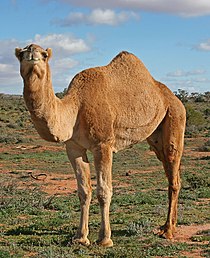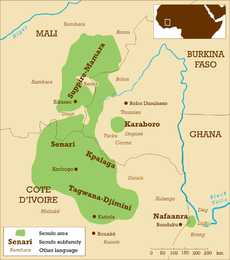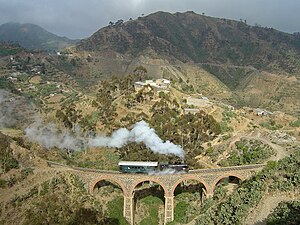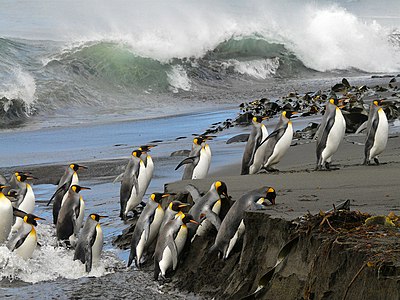Portal:Africa



Africa is the world's second-largest and second-most populous continent after Asia. At about 30.3 million km2 (11.7 million square miles) including adjacent islands, it covers 20% of Earth's land area and 6% of its total surface area. With nearly 1.4 billion people as of 2021, it accounts for about 18% of the world's human population. Africa's population is the youngest among all the continents; the median age in 2012 was 19.7, when the worldwide median age was 30.4. Based on 2024 projections, Africa's population will reach 3.8 billion people by 2099. Africa is the least wealthy inhabited continent per capita and second-least wealthy by total wealth, ahead of Oceania. Scholars have attributed this to different factors including geography, climate, corruption, colonialism, the Cold War, and neocolonialism. Despite this low concentration of wealth, recent economic expansion and a large and young population make Africa an important economic market in the broader global context. Africa has a large quantity of natural resources and food resources, including diamonds, sugar, salt, gold, iron, cobalt, uranium, copper, bauxite, silver, petroleum, natural gas, cocoa beans, and.
Africa straddles the equator and the prime meridian. It is the only continent to stretch from the northern temperate to the southern temperate zones. The majority of the continent and its countries are in the Northern Hemisphere, with a substantial portion and a number of countries in the Southern Hemisphere. Most of the continent lies in the tropics, except for a large part of Western Sahara, Algeria, Libya and Egypt, the northern tip of Mauritania, and the entire territories of Morocco and Tunisia, which in turn are located above the tropic of Cancer, in the northern temperate zone. In the other extreme of the continent, southern Namibia, southern Botswana, great parts of South Africa, the entire territories of Lesotho and Eswatini and the southern tips of Mozambique and Madagascar are located below the tropic of Capricorn, in the southern temperate zone.
Africa is highly biodiverse; it is the continent with the largest number of megafauna species, as it was least affected by the extinction of the Pleistocene megafauna. However, Africa also is heavily affected by a wide range of environmental issues, including desertification, deforestation, water scarcity, and pollution. These entrenched environmental concerns are expected to worsen as climate change impacts Africa. The UN Intergovernmental Panel on Climate Change has identified Africa as the continent most vulnerable to climate change.
The history of Africa is long, complex, and varied, and has often been under-appreciated by the global historical community. In African societies the oral word is revered, and they have generally recorded their history via oral tradition, which has led anthropologists to term them oral civilisations, contrasted with literate civilisations which pride the written word. During the colonial period, oral sources were deprecated by European historians, which gave them the impression Africa had no recorded history. African historiography became organized at the academic level in the mid-20th century, and saw a movement towards utilising oral sources in a multidisciplinary approach, culminating in the General History of Africa, edited by specialists from across the continent. (Full article...)
Selected article –
Tropical Cyclone Elita was an unusual tropical cyclone that made landfall on Madagascar three times. The fifth named storm of the 2003–04 South-West Indian Ocean cyclone season, Elita developed in the Mozambique Channel on January 24, 2004. It strengthened to tropical cyclone status before striking northwestern Madagascar on January 28; it was the first storm to strike western Madagascar at that intensity since Cyclone Cynthia in 1991. Elita weakened to tropical depression status while crossing the island, and after exiting into the southwest Indian Ocean, it turned to the west and moved ashore in eastern Madagascar on January 31. After once again crossing the island, the cyclone reached the Mozambique Channel and re-intensified. Elita turned to the southeast to make its final landfall on February 3 along southwestern Madagascar. Two days later, it underwent an extratropical transition; subsequently, the remnant system moved erratically before dissipating on February 13.
Elita dropped heavy rainfall of more than 200 mm (8 inches), which damaged or destroyed thousands of houses in Madagascar. Over 50,000 people were left homeless, primarily in Mahajanga and Toliara provinces. Flooding from the storm ruined more than 450 km2 (170 sq mi) of agricultural land, including important crops for food. Across the island, the cyclone caused 33 deaths, with its impact further compounded by Cyclone Gafilo about two months later. Elsewhere, Elita brought rainfall and damage to Mozambique and Malawi, and its outer wind circulation produced rough seas and strong gusts in Seychelles, Mauritius, and Réunion. (Full article...)
Featured pictures –
Did you know (auto-generated) -

- ... that Ruth L. Bennett provided shelter for more than 2,000 black women and girls who migrated north to Chester, Pennsylvania, as part of the Great Migration?
- ... that the Phoenixonian Institute was the first African-American high school in California?
- ... that the Enterprise, a black newspaper in Omaha, supported a separate African American department at the 1898 Trans-Mississippi Exposition?
- ... that the parliamentary sign-language interpreter could not make out what South African MP Joan Fubbs tried to say in her tribute to President Cyril Ramaphosa?
- ... that South African civil rights activist Thambi Naidoo was arrested along with Mahatma Gandhi and sent outside of Transvaal for refusing to register?
- ... that South African physician Tlaleng Mofokeng is the United Nations special rapporteur on the right to health, and was named one of the BBC's 100 Women?
Categories
Selected biography –
Souleymane "Sol" Bamba (13 January 1985 – 31 August 2024) was a professional football player and manager. As a player, he was a centre-back. Born in France, he played for the Ivory Coast national team.
Bamba started his career in his native France with Paris Saint-Germain, but failed to establish himself in their first team. He moved to Scotland to join Dunfermline Athletic in 2006, helping the club reach the final of the Scottish Cup in his first season. Two years later, he was transferred to Hibernian, before joining English side Leicester City in January 2011. (Full article...)
Selected country –
 |
 |
|

| ||
The Central African Republic (CAR, French: République Centrafricaine IPA: /ʀepyblik sɑ̃tʀafʀikɛn/ or Centrafrique /sɑ̃tʀafʀik/) is a landlocked country in Central Africa. It borders Chad in the north, Sudan in the east, the Republic of the Congo and the Democratic Republic of the Congo in the south, and Cameroon in the west. Most of the CAR consists of Sudano-Guinean savannas but it also includes a Sahelo-Sudanese zone in the north and an equatorial forest zone in the south.
Since most of the territory is located in the Ubangi and Shari river basins, the French called the colony it carved out in this region Ubangi-Shari, or Oubangui-Chari in French. The colony became a semi-autonomous territory of the French Community in 1958 and then an independent nation on 13 August 1960. The first fair democratic elections, held in 1993, brought Ange-Félix Patassé to power. Patassé was overthrown by French-backed General François Bozizé in 2003, who won a democratic election in May 2005 and remains in power today. (Read more...)
Selected city –
Mogadishu, locally known as Xamar or Hamar, is the capital and most populous city of Somalia. The city has served as an important port connecting traders across the Indian Ocean for millennia and has an estimated urban population of 2,610,483.
Mogadishu is located in the coastal Banaadir region on the Indian Ocean, which, unlike other Somali regions, is considered a municipality rather than a maamul goboleed (federal state). (Full article...)
In the news
- 12 February 2024 –
- Two boats collide on the Congo River near Kinshasa, Democratic Republic of the Congo; with the death toll remains unclear. (AP)
- 11 February 2024 – 2023 Africa Cup of Nations
- In association football, hosts Ivory Coast win their third Africa Cup of Nations by defeating Nigeria 2–1 in the final. Sébastien Haller scores the winning goal in the 81st minute. (The Guardian)
- 10 February 2024 – Somali civil war
- Four Emirati soldiers and a Bahraini military officer are killed, while ten other people are injured, when a soldier opens fire at a military base in Mogadishu, Somalia, before being killed in the ensuing shootout. Al-Shabaab claims responsibility. (AP)
- 10 February 2024 –
- A Eurocopter EC130 helicopter crashes near Nipton, California, United States, killing all the six people on board, including Nigerian banker Herbert Wigwe. (CBS News)
- 10 February 2024 – 2023–2024 Senegalese protests
- Violent protests occur in Senegal following an announcement by President Macky Sall that presidential elections have been delayed from February 25 to December 15. (Sky News)
- 9 February 2024 –
- At least 18 people are killed during a collision between a bus and a truck on a road in Kinshasa, Democratic Republic of the Congo. (AP)
Updated: 16:33, 14 February 2024
General images -
Africa topics
More did you know –
- ... that Liberia College in the country of Liberia was authorized by the legislature in 1851, but did not start classes until 1863?
- ... that the forced removal of 700,000 people from slums in Zimbabwe in 2005 was called "a crime against humanity" by the UN?
- ... that the supreme god of the southern African Bushmen is Cagn, a trickster who shapeshifts into a praying mantis?
- ... that Bahá'í Faith in Niger began during a period of wide scale growth in the religion across Sub-Saharan Africa near the end of its colonial period?
Related portals
Major Religions in Africa
North Africa
West Africa
Central Africa
East Africa
Southern Africa
Associated Wikimedia
The following Wikimedia Foundation sister projects provide more on this subject:
-
Commons
Free media repository -
Wikibooks
Free textbooks and manuals -
Wikidata
Free knowledge base -
Wikinews
Free-content news -
Wikiquote
Collection of quotations -
Wikisource
Free-content library -
Wikispecies
Directory of species -
Wikiversity
Free learning tools -
Wikivoyage
Free travel guide -
Wiktionary
Dictionary and thesaurus

























































































